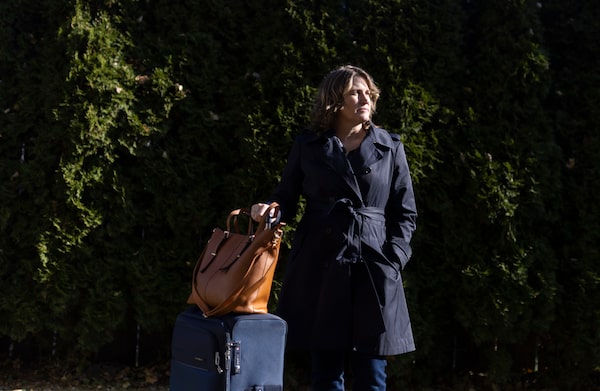
Laurie Partington is a 'bleisure' traveller: one who combines business and leisure in one package.Christinne Muschi
As a marketing manager, Laurie Partington travels to trade shows and conferences several times a year, often turning that work into a perk by adding a little personal time to the trip.
Ms. Partington, who works for Matrox Imaging in Montreal, is a ‘bleisure’ traveller, combining business and leisure by adding a few days before or after a business trip to make the most of the flight and take in the sights. It’s a trend that’s grown more popular since pandemic travel restrictions began lifting.
“What works for me and I’ve always been lucky to do is, depending on where I’m going, I typically will fly in a little earlier or a little later, as long as that flight doesn’t cost the company anything extra,” she says. “It can work out well if you’re a little bit creative about extending your trip on your own dime.”
Sometimes, travelling mid-week even saves money on the cost of a flight, says Ms. Partington, who just returned from two trade shows back-to-back, one in Germany and another in Boston.
In Germany, where she travels about once a year, she usually takes some personal time to visit an uncle who lives there. She’s even had her sister and mom fly over at the same time, joining them for the weekend before and after the week-long trade show.
She’s been able to be a tourist in cities like Boston, Chicago and Detroit, thanks to work travel, and a few years ago tacked some personal time onto a work trip to Spain. She’s also tagged along with her husband on business trips to Chile and France.
“I was there in September, and the weather was amazing, and every evening I walked on the beach in Barcelona. That’s a pretty great perk,” she says.
A recent survey done in the U.S. shows 89 per cent of business travelers plan to add personal vacation time to their business trips in the coming months. The rise of remote work during the pandemic has made it more popular and more feasible for employers.
KPMG took bleisure travel to a new level in May by introducing a remote work and travel program that allows employees to work up to eight weeks from anywhere in Canada or up to four weeks from pre-approved countries abroad.
That includes adding time onto a business trip or planning a personal trip, says Rajini Sahanandan, director of workforce mobility at KPMG.
“Our people have largely worked from home for the past two years, and that’s been challenging,” she says. With travel restrictions lifting, she says employees were eager for travel opportunities.
“As a firm, we’ve always believed that these global experiences provide new perspectives; that when we travel, it promotes innovation, creativity, and empathy,” Ms. Sahanandan says. “And we know with this program, it’s going to help our people feel refreshed and re-energized after such a long pandemic.”
The company also has a lot of newcomers to Canada on staff, she says, and they haven’t been able to go home to visit family for the past couple of years.
“This program gives them the opportunity to go home for an extended visit, and they can both use vacation time, and they can work, and they can spend that time with their families after being separated for so long,” she says.
Based on research into taxation and immigration rules, the company has a list of approved countries, including Brazil, the Bahamas, the Cayman Islands, Croatia, Mexico, Bermuda, France (for European Union citizens), and the United Kingdom (for U.K. citizens) and Florida in the U.S. The list is expected to expand as the laws are reviewed in more countries.
The program has proven to be very popular.
“We’ve seen people going to PEI, to B.C., and on a beach in Croatia or Mexico. It’s just been so amazing to see people reconnect with families or be re-energized and refreshed from this experience,” she says.
Work travel can be exhausting, says Claire Newell, founder and president of Metro Vancouver-based Travel Best Bets. By taking the time to explore the destination, whether for vacation time or just an evening out after work, business travellers can make it much more enjoyable.
“We are seeing more people take advantage of the fact that, when you’re going on a business trip, and you extend, you don’t have to pay for the airfare, only those extra nights’ accommodation and incidentals,” she says. “And many businesses are allowing their staff to extend because they know that technology will allow them to work from anywhere.”
She suggests that by doing some research ahead of time, business travellers can discover a new city or use it as a jumping-off point to other nearby destinations.
Airfare is a big chunk of the expense of a getaway and she says that coming to an agreement with an employer is taken care of. It may not save the company money on airfare, but it won’t cost more either, she adds.
“It’s a great perk,” Ms. Newell says.
She does caution bleisure travellers to make sure they have travel insurance. Even if they have it through work, they might need to pay for the extra days they are there on their own time.